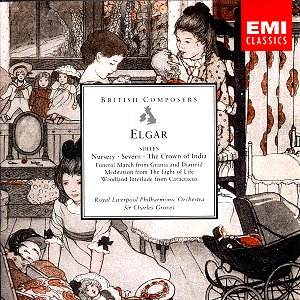The reputation of Sir Charles Groves (1915-1992) seems
to have faded somewhat. I think this is a great pity for he made a sterling
contribution to post-war British musical life, particularly as Principal
Conductor of the Bournemouth Symphony Orchestra (1951-61) and of the
Royal Liverpool Philharmonic Orchestra (1963-77). In particular, he
promoted much unfamiliar and contemporary music and was an untiring
champion of English music. This welcome reissue shows his not inconsiderable
credentials as an Elgarian.
Much of the music on the disc might be described as
old wine in new bottles for all three suites included here were based
by Elgar on earlier sketches for other works or on music written in
his very young days. The Severn Suite was all based on early
material and was written for the National Brass Band Championships in
1930 as a test piece. Elgar subsequently orchestrated it and it is in
that later guise that Groves performs it. I must say that, despite the
greater range of colour provided by the full orchestra I prefer the
brass band version. In particular I miss the nostalgic sound of the
cornets, especially in the fourth movement. However, here the orchestral
version receives a strong and forthright performance. Moreover, Groves
captures well the atmosphere in the third movement, a slow fugue which
represents Worcester Cathedral (Track 12).
The Crown of India suite suits Groves’s style
well. It was written in 1912, again drawing on old material, for a masque
marking the visit to India by King George V and Queen Mary. The suite
which Elgar subsequently drew from this music is not top drawer Elgar
but, appropriately, it is full of colour and Groves and his players
bring out the colours with relish, for example in the Warrior’s Dance
(Track 20). They also bring a suitable delicacy to the Dance of Nautch
Girls (Track 18). The dreamy Intermezzo features a finely spun solo
from Clifford Knowles, then the RLPO’s long-serving leader. The splendidly
extrovert March of the Mogul Emperors (Track 22) has all the swagger
one could wish for to end the suite (and the CD).
The Nursery Suite is a beautifully wrought set
of miniatures, the chief characteristic of which is an innocent charm.
The suite was written in 1930 as a tribute to the Royal Family following
the birth of Princess Margaret and for this Elgar drew on some of his
juvenilia. The suite is played here with affection and finesse. For
instance, there is a lovely flute solo from Atarah Ben-Tovim in the
second movement, ‘The Serious Doll’ (Track 2) and the concluding ‘Dreaming’
and ‘Envoy’ (Tracks 7 and 8) are very affecting. The latter features
some more fine solo work from Clifford Knowles.
It is particularly interesting to hear the fifth movement,
‘The Wagon (Passes)’, now that Anthony Payne has drawn on this for the
conclusion of his elaboration of the sketches for Elgar’s Third Symphony.
In his book about the reconstruction (Faber and Faber, 1998) Payne concludes
with a touching story. After the première of the reconstructed
symphony, among the many letters he received from the public was one
from a Mr. Derek Johnstone who related that in 1942 he took an Associated
Board piano examination in his home town of Dumfries. The examiner was
W. H. Reed, Elgar’s long-time friend and the former leader of the LSO).
The non-appearance of the next candidate gave Mr. Johnstone an unexpected
opportunity to chat to Reed who talked about Elgar and played over ‘The
Wagon (Passes)’ at the piano. The very next day Reed collapsed and died
and Mr. Johnstone speculates, probably correctly, that this little piece
was the last music by Elgar that Reed ever played.
To return to the music. The disc is completed by three
short pieces. The Funeral March from Grania and Diarmid is a
magnificent elegy and I’m surprised we don’t hear it more often. Groves
and the RLPO play it excellently. The also give a good account of the
Woodland Interlude from Caractacus though perhaps their performance
does lack the last ounce of subtlety and innocence.
The one disappointment is the Meditation from The
Light of Life. This starts a bit too slowly but what really scuppers
the performance is the lugubrious speed which Groves adopts at the Piu
lento at cue C in the vocal score (Track 15 2’21"). The performance
never recovers from this and is ponderous thereafter. Ten years later
when Groves came to make a complete recording of the oratorio he did
not fall into the same trap and his performance then took 5’53"
(exactly the same as Sir Adrian Boult’s performance of the Meditation,
just reissued by EMI) compared with the 7’23" he takes on this
disc.
However, that’s the only disappointment on what is
otherwise a well-played, idiomatic collection which will give much pleasure.
The notes are by Michael Kennedy, a guarantee of excellence, and the
sound is full and satisfying. EMI have just issued a CD of similar repertoire
conducted by Boult but, apart from the Meditation, there are no overlaps
whatsoever. I can recommend this confidently, the more so as it is such
a good example of the work of Sir Charles Groves. I hope we shall have
more reissues of his recordings soon.
John Quinn


